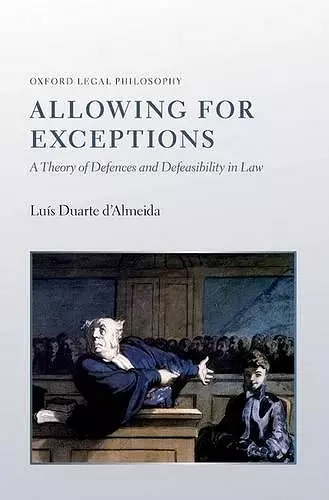Allowing for Exceptions
A Theory of Defences and Defeasibility in Law
Format:Hardback
Publisher:Oxford University Press
Published:26th Mar '15
Currently unavailable, and unfortunately no date known when it will be back

You find yourself in a court of law, accused of having hit someone. What can you do to avoid conviction? You could simply deny the accusation: 'No, I didn't do it'. But suppose you did do it. You may then give a different answer. 'Yes, I hit him', you grant, 'but it was self-defence'; or 'Yes, but I was acting under duress'. To answer in this way-to offer a 'Yes, but. . .' reply-is to hold that your particular wrong was committed in exceptional circumstances. Perhaps it is true that, as a rule, wrongdoers ought to be convicted. But in your case the court should set the rule aside. You should be acquitted. Within limits, the law allows for exceptions. Or so we tend to think. In fact, the line between rules and exceptions is harder to draw than it seems. How are we to determine what counts as an exception and what as part of the relevant rule? The distinction has important practical implications. But legal theorists have found the notion of an exception surprisingly difficult to explain. This is the longstanding jurisprudential problem that this book seeks to solve. The book is divided into three parts. Part I, Defeasibility in Question, introduces the topic and articulates the core puzzle of defeasibility in law. Part II, Defeasibility in Theory, develops a comprehensive proof-based account of legal exceptions. Part III, Defeasibility in Action, looks more closely into the workings of exceptions in accusatory contexts, including the criminal trial.
Rigorously argued, erudite and persuasive. . . An immensely impressive piece of legal and philosophical scholarship. * Vincent Chiao, Law and Philosophy *
Tightly argued and highly valuable...In explaining the intersection of defenses, defeaters, and exceptions in criminal law, in law generally, and for rules generally by use of the idea of the burden of proof, [Duarte] d'Almeida has not only offered a more than plausible solution to the problem he has set out to solve, and has not only done so with admirable rigor, but has also made a substantial contribution to the literature on rules more generally...Deserves to be read and absorbed by anyone interested in deontic logic, artificial intelligence, the operation of legal (and other) rules, and the characteristics of normative systems generally, whether those be the normative systems of law, of games, of etiquette, or even of morality. * Frederick Schauer, Notre Dame Philosophical Reviews *
[A]n extraordinary achievement. The depth of research is remarkable: work on defeasibility from a number of disciplines (and from literature in numerous languages) is examined, but never does the book descend to literature review. There are interesting contributions to many topics, including burdens of proof, the concept of action and criminal law theory. The writing is crisp, the arguments clear. Although the conclusions are striking and at times controversial, their controversy is not hidden and the flaws of rival views are carefully explained. In many respects, it is a model of scholarship. It deserves to be widely read not only by philosophers of action and law, but also any lawyer who thinks seriously about defences. * Frederick Wilmot-Smith, The Law Quarterly Review *
ISBN: 9780199685783
Dimensions: 241mm x 164mm x 23mm
Weight: 624g
308 pages